
views
Adjusting Your Attitude

Put yourself in your teacher’s shoes. Though you may think that your teacher is the meanest person in the world, you should try having some compassion to see if there may be something more going on. Try to think about why your teacher is being “mean” and if this is because your teacher feels disrespected in the classroom. Maybe all of the students are mean, maybe many of them don’t take the material seriously, or maybe a handful of students are so disruptive that it’s impossible to learn. Your teacher may be “mean” because they feel like there’s no other way to get people to listen. Putting yourself in another person’s shoes is a skill that can be useful for the rest of your life. Developing empathy and compassion can help you in social and work situations for the rest of your life. Learning to step outside yourself can help you see a situation in a new light and solve problems. You should tell them how you feel. Do not express this in a disrespectful way. Be kind. Of course, it can be hard to see your teacher as anyone other than a mean person who is getting you down, but you should remember that they're only human, too.

Work with your teacher, not against them. If you’re dealing with a mean teacher, then your natural impulse may be to prove your teacher wrong, to make your teacher feel bad about themself, or just to be a wise guy in the classroom. However, if you try to fight fire with fire, that is only guaranteed to make the situation worse. Instead of trying to outsmart your teacher, work on being positive towards your teacher, helping them out when it’s needed, and being a good student. If you make an effort to be kinder to your teacher, then they will return the favor. Though it may be challenging to be nice to a person you don’t like, it can help them be nicer to you, which can lead to better feelings all around. This is another skill you may need to use later on in life, so it’s best to get some practice, now. Don’t think of it as being fake. Think of it as making the situation as bearable as possible for everybody.

Be positive instead of complaining. Another way to deal with a mean teacher is to work on being positive in the classroom, instead of arguing or complaining about every little thing. Don’t spend so much time complaining that the last test was hard; instead, ask yourself if you can do better next time if you study more. Don’t talk about how Charlotte’s Web was the most boring book you’ve ever had to read; instead, focus on the parts of it you really liked. Being more positive toward your teacher will help set a more positive tone in the classroom, and it should lead your teacher to be less mean. Try to focus on the things you do like about the learning experience. Being excited about new material will make class more fun for you, and will make your teacher less likely to be mean. They will be more inclined to soften if they see that you genuinely care. Think about it: it can be pretty discouraging for your teacher to teach something they are really excited about, only to get groans and eye rolls in response. Of course that would encourage meanness.

Don’t talk back to your teacher. Talking back to your teacher won’t get you anywhere. Sure, you’ll experience some brief satisfaction at telling them off and might make your friends giggle, but this will only lead you to make your teacher resent you more and to become more mean. If you have something to say, talk to them after class in a calm and reasonable manner instead of trying to show off during class. You may see other students talking back and may think this is appropriate. However, it’s your job to rise above the common denominator and set an example for others. Take few deep breaths when your teacher is being mean so you can get through the situation without breaking down. If you disagree with your teacher, try to be as respectful as possible, and ask them questions instead of making statements that make them feel wronged.

Find what makes your teacher tick. Figuring out what motivates your teacher can really help you deal with them. If your teacher is being mean because no one is participating, then try to speak up more in class. If your teacher is mean because they feel disrespected, then try to stop laughing at them behind their back. If they're mean because no one is paying attention, then make an extra effort to answer their questions and to put away any distractions. Giving them what they want can help them become less mean. Believe it or not, but everyone has a soft spot. Maybe your teacher is really into cats. Doing something as simple as telling them about your cat or asking to see pictures of theirs can make them open up to you a bit. Even giving your teacher a real compliment, like saying you like a new poster on the wall, can help motivate your teacher to be nice if they take a lot of pride in their classroom.
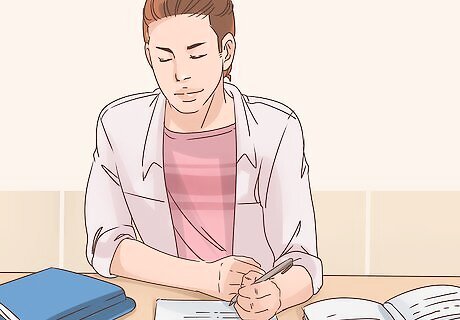
If there’s really a problem, start documenting what the teacher does and get your parents involved. Sometimes, your teacher really is behaving poorly and their actions are not justified. If your teacher is truly mean and is hurting your feelings, making fun of you, and making you and the other students feel inadequate, then you may need to take further action. First, you should take some time to document all of the things your teacher says and write them down; then, you can take these comments and actions to your parents and discuss what to do next. Don’t make this too obvious. Just bring a notebook to class and write down the upsetting things your teacher says. You can also make a mental note of them and write them down after class. Though generally saying your teacher is mean can have an impact, just as you might have learned in school, solid arguments need to be made with specific examples. The more specific examples you have about your teacher’s meanness, the more convincing your case will be.
Being on Your Best Behavior
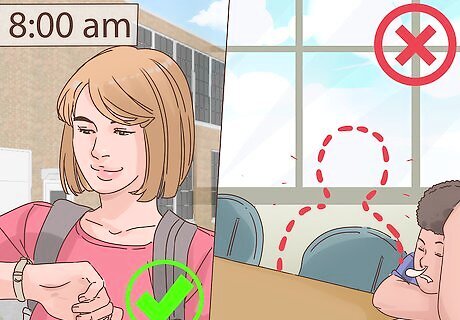
Get to class on time. One way to make sure your teacher isn’t mean to you is to respect their rules. One of the rudest and most disrespectful things you can do is to get to class late, especially if you make a habit of it. This is a way of telling your teacher that you don’t care at all about their class and to get their on your bad side immediately. If you are late, then you should apologize and make sure it doesn’t happen again. Don’t be one of those kids who packs up all of their things when there’s five minutes left of class. The need to leave early will drive your teacher even crazier than being late to class.
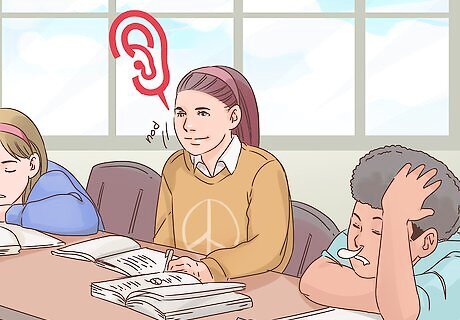
Listen to your teacher. If you want to deal with a mean teacher, then you should really make an effort to listen to what the teacher is telling you. One of the reasons teachers may seem mean is because they feel like their students aren’t listening to them and like they’re not getting any respect. When your teacher is talking, listen carefully and avoid getting distracted by your phone, the people in the halls, or your classmates. Though it’s important to ask questions, one of the things that can make teachers mean is students who ask very obvious questions about things their teachers have stated again and again. Make sure you listen carefully so you don’t make this mistake.
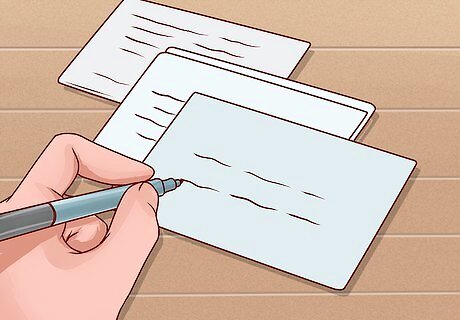
Take notes. Taking notes will show your teacher that you really do care about their class and that you’re not just there to pass the time. It will also make you gain an understanding of the subject matter and will show your teacher that you really care about the class. Teachers also like to see their students taking notes when they talk because it’s a sign that they’re paying attention. Make a habit of taking notes as often as you can so your teacher starts to feel more kindly towards you. Taking notes will also help you do better in school, and this can make your teacher nicer, too.

Participate in class. It’s possible that your teacher is being mean to you because they think you don’t care about the class at all. This may be because you haven’t been making an effort to participate. The next time you get a chance, you should raise your hand to answer your teacher’s questions, volunteer to help your teacher out, or be active in a group discussion. This will make your teacher see that you really do care and they will be kinder towards you. Though you shouldn’t try to answer every question every time, make an effort to be engaged in the material so your teacher is more inclined to be nice. Participating in class will not only make your teacher nicer, but it will also make the learning experience more fun for you. If you’re more engaged in the material, you’ll be less likely to get bored or distracted in class.
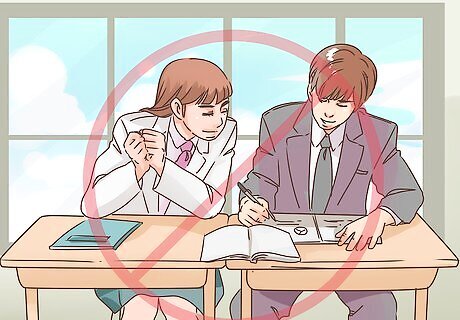
Avoid talking to your friends during class. If you want to get on your teacher’s good side, then you should avoid talking to your friends unless you’re engaged in a group activity. This is distracting for teachers and makes them feel like you don’t care about them at all. The next time your friends try to laugh with you or pass you a note, make them see that you want to focus on the class and that you’ll talk to them later. If you have a chance to choose your seat, try to sit away from your friends or distracting students so your teacher has less reason to be mean to you.
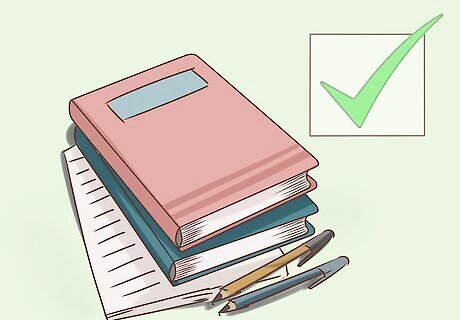
Make sure you always bring all the required materials for their lesson. Having the right materials will help you focus on learning and it will show your teacher that you are prepared for class. Similarly, turn in all your homework on time as this shows that you enjoy the material and that you are willing to learn.

Don’t make fun of your teacher. If you’re dealing with a mean teacher, then chances are that the other students often make fun of them. Though it may be tempting to join in on their antics or even to lead the pack, you should hold back and avoid making fun of your teacher, because this is guaranteed to only make your teacher feel angrier and act meaner. You may think you’re being clever, but it’s very likely that your teacher is on to you if you’re openly making fun of them in class. Teachers are people, too, and they can be sensitive. If your teacher catches you making fun of them, then it’ll be hard to win your teacher over again. If your friends are teasing your teacher, try to separate yourself from them. You don’t want to be associated with that kind of behavior.

Ask for extra help after class. One way to make your teacher less mean to you is to ask for extra help with the material after class. You may be terrified of being alone with your teacher, but you’d be surprised to find that most teachers actually love sharing their wisdom on the subjects they teach and that your teacher would actually be very happy to help you. If you have a test coming up in a week or two or have a concept you don’t quite understand, then ask your teacher if they can help you after school one day; you’d be surprised by how much nicer your teacher will act after you ask. This should work most of the time. However, if your teacher is really very mean, then they may turn you down, but it’s worth trying. If you do choose to ask for help, the important thing is to ask well in advance before any tests. If you ask for help a day or two before the test, your teacher may get angry and may wonder why you didn’t ask sooner.

Don’t suck up too much. Though being a good student and respecting your teacher’s rules can definitely make your teacher less mean to you, you don’t want to take it too far. If your teacher thinks that you’re sucking up and not being genuine, and if you try a little too hard to answer your teacher’s questions, compliment your teacher, or to hover around your teacher’s desk, asking how you can help, then your teacher may actually act meaner because they will be suspicious of your true intentions. If your teacher is naturally mean, then they will naturally be suspicious of a student who is trying too hard to get in their good graces. Make it feel natural.
Dealing with a Mean Teacher As a Parent

Ask your child to describe what the teacher did. When it comes to dealing with a mean teacher, the first thing you need to do is to get the facts straight. Talk to your child about what the teacher did and why the teacher is really mean. Make sure your child has specific examples instead of just saying the teacher is generally mean; if your child doesn’t have many examples, ask them to go to school and try to write some down to show you what mean things the teacher did. This will give you a better sense of the situation. Sit your child down and have a frank conversation about the teacher. Make sure the child takes the time to tell you as much as they can in as much detail as possible instead of just making passing comments. If your child is crying or very upset when talking about the teacher, help them calm down so you can get more concrete information.

Make sure that the teacher is out of line. Of course, it can be challenging to see if your child is really experiencing unfairness because you love them so much and can’t stand the idea of anyone being mean to them. However, you have to make sure that what your child is telling you is an indication that the teacher is really out of line and that this behavior needs to be stopped. If your child is being sensitive and has made a similar complaint about many teachers before, then you have to think carefully before taking action. Of course, your first instinct should be to trust and protect your child, but you need to think about how your child’s behavior may be impacting your teacher. Consider the possibility that both your child and the teacher may be at fault.

Talk to other parents to see if they’ve heard the same from their children. Another thing you can do is to talk to the other parents of the children in your school to see if they’ve heard similar complaints from their kids. If they’ve heard similar comments, then this will help you see that the situation needs to be stopped. Of course, just because they haven’t heard anything doesn’t mean that the teacher isn’t really acting inappropriately, but it’s good to cover your bases. You don’t need to pry too much, but it won’t hurt to casually mention that your child has been running into some trouble with their teacher, and to see if their children have made similar comments. Strength in numbers is important. If there are more parents who are angry about the teacher, it’s more likely that some action can be taken.

Meet with the teacher face to face to see for yourself. If your child is really being hurt by your teacher or is just telling you that they're mean, then it may be time to set up a meeting with the teacher to see for yourself. Either the teacher will prove your child right and will be mean and dismissive in person, or the teacher may cover up their meanness and will pretend that everything is fine; additionally, you may find that the teacher isn’t as mean as you expected, and you will have to decide what to do next. Take the time to really get a sense of who the teacher is and what they may be frustrated about. If your teacher is mean or demeaning when talking about your child, or just generally seems to dislike their students, then you may have a problem. Trust your gut. If the teacher seems nice, do you think they're faking it, or does it feel genuine?

If there’s a problem, take it to the principal or other administrators. If you’re convinced, after talking to the teacher or your child, that further action really needs to be taken, then it’s time to take the matter to the school principal or other administrators. You don’t want your child to be in a learning environment that is very discouraging and keeps them from being excited about learning and coming to school. Set up an appointment with the administrators at your earliest convenience and plan exactly what you’re going to say. Use the concrete details your child has given you to show that the behavior is inappropriate. You can’t just say that the teacher is mean, but you can point to several things the teacher said that were out of line. If other parents are with you on this, then having them also make appointments with the administrators, or even setting up a group meeting, can have an even larger impact.

If nothing can be done, decide if you want to take further action. Unfortunately, your complaints with administrators may not be enough to move the needle. At that point, you can decide what, if any, further action needs to be taken. You may see if you can place your child in a different class or even if it’s worth it to switch schools. Or alternately, if you think these drastic steps aren’t worth it, then you may need to have a conversation with your child about getting through the year and not letting the mean teacher shake their confidence. If you decide not to take further action, you can talk to your child about how this is a life lesson. Unfortunately, in life, we sometimes have to deal with people we really don’t like. Learning how to cooperate with them and not letting them get to you is an important skill that can help us get through life. This may not feel like the most comforting answer, but this may be the best you can do.




















Comments
0 comment